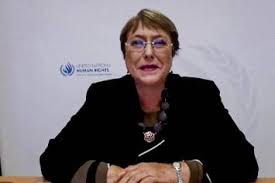UNITED NATIONS: The UN High Commissioner for Human Rights (UNHCR) Michelle Bachelet on Tuesday appealed to the Indian Government to safeguard the rights of human rights defenders and NGOs, and their ability to carry out crucial work on behalf of the many groups they represent.
Bachelet in a statement expressed regret at the tightening of space for human rights NGOs in particular, including by the application of “vaguely worded” laws that constrain NGOs’ activities and restrict foreign funding.
“India has long had a strong civil society, which has been at the forefront of groundbreaking human rights advocacy within the country and globally,” the High Commissioner said. “But I am concerned that vaguely defined laws are increasingly being used to stifle these voices.”
Bachelet cited as worrying the use of the Foreign Contribution Regulation Act (FCRA), which prohibits the receipt of foreign funds “for any activities prejudicial to the public interest.”
The Act, which was adopted in 2010 and was amended last month, has had a detrimental impact on the right to freedom of association and expression of human rights NGOs, and as a result on their ability to serve as effective advocates to protect and promote human rights in India.
It is expected that the new amendments will create even more administrative and practical hurdles for such advocacy-based NGOs.
Most recently, Amnesty International was compelled to close its offices in India after its bank accounts were frozen over alleged violation of the FCRA.
“The FCRA has been invoked over the years to justify an array of highly intrusive measures, ranging from official raids on NGO offices and freezing of bank accounts, to suspension or cancellation of registration, including of civil society organisations that have engaged with UN human rights bodies,” said Bachelet.
“I am concerned that such actions based on the grounds of vaguely defined ‘public interest’ leave this law open to abuse, and that it is indeed actually being used to deter or punish NGOs for human rights reporting and advocacy that the authorities perceive as critical in nature. Constructive criticism is the lifeblood of democracy. Even if the authorities find it uncomfortable, it should never be criminalised or outlawed in this way,” Bachelet added.
“I urge the government to ensure that no one else is detained for exercising their rights to freedom of expression and peaceful assembly – and to do its utmost, in law and policy, to protect India’s robust civil society,” said the High Commissioner.


